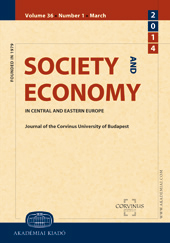Is globalization a driver of economic growth and social development? A cross-national, quantitative perspective on current, pro-globalist strategies of the European Union
Is globalization a driver of economic growth and social development? A cross-national, quantitative perspective on current, pro-globalist strategies of the European Union
Author(s): Arno TauschSubject(s): Supranational / Global Economy, Economic history, Economic policy, Social development, Economic development, EU-Accession / EU-DEvelopment, Globalization
Published by: Akadémiai Kiadó
Keywords: Lisbon process; European Union; Latin America; dependency theory;
Summary/Abstract: This article starts from the assumptions that the world can learn a lot from the empirical and theoretical debates and research results of dependency and world systems research. The European ‘political class’ seems to react more slowly to the implications of the global economic crisis. The policy package currently offered by the Commission still relies on open economies as pillar number 1 of any conceivable strategy. A rediscovery of this radical ‘dependency perspective’, first introduced by the Argentine economist Raúl Prebisch and other Latin American thinkers during the Great Depression of the 1930s, and more fully developed in the so-called Latin American ‘dependency debate’ of the late 1960s and 1970s; and the current empirical ‘world systems theory’ mean a fundamental break with the existing dominant thinking on the subject of economic and social convergence. Continuing critical perspectives, initiated by Polanyi, and developed in Hungary by Andor, Inotai and Szentes, and above all in the quantitative investigations by the Swiss sociologist Volker Bornschier and his associates, we show that on a global cross-national scale, very important indicators of the future and well-being of our continent, ranging from the famous ‘European social model’ to tertiary educational enrolment, infant mortality, rule of law, female survival rates, economic growth, inequality, unemployment, and environmental security are significantly being determined by our models, and all the explanations point in the direction of the penetration of multinational corporations (MNCs) and its growth over time as constituting a major and important development bottleneck. Our dependency approach thus re-iterates the substantial findings, proposed by the Bornschier sociological school. A thorough re-thinking of basic premises of policy-making in Europe is thus necessary. In our opinion, European policy-making finally should dare to take the globalization-critical organizations of ‘civil society’ seriously.
Journal: Society and Economy. In Central and Eastern Europe ǀ Journal of the Corvinus University of Budapest
- Issue Year: 33/2011
- Issue No: 3
- Page Range: 505-524
- Page Count: 20
- Language: English

